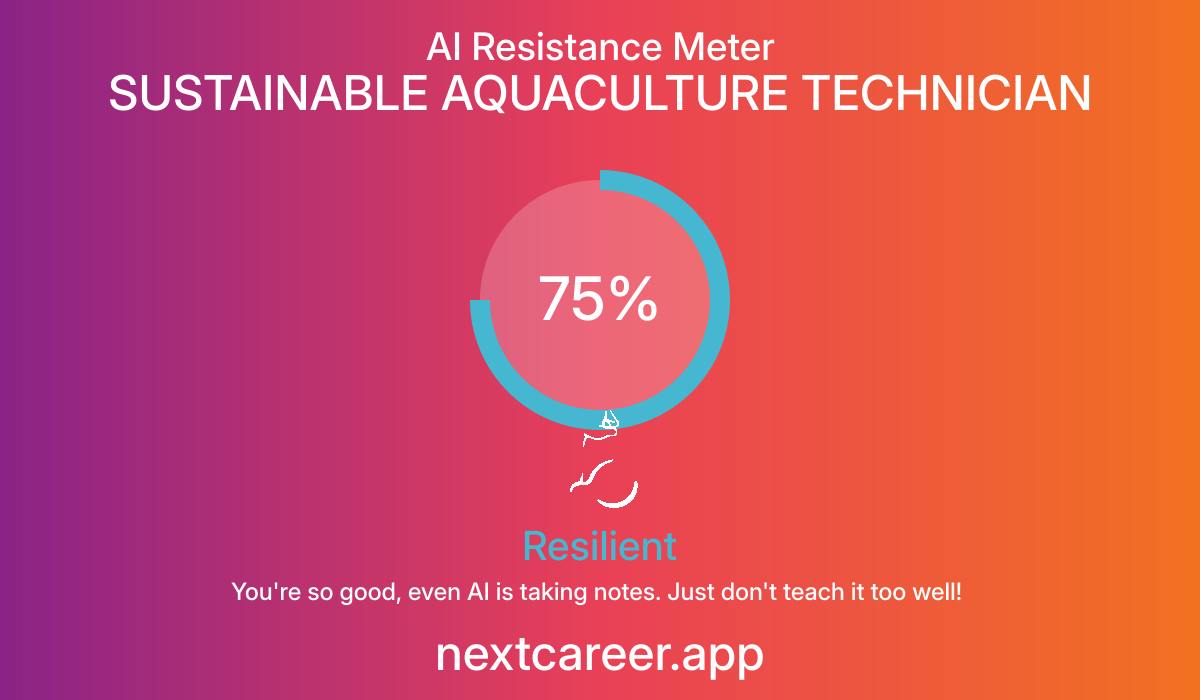AI Resistance Analysis
SUSTAINABLE AQUACULTURE TECHNICIAN
SUSTAINABLE AQUACULTURE TECHNICIAN
AI Resistance Score
AI Resistance Meter
Resilient
SUSTAINABLE AQUACULTURE TECHNICIAN
You're so good, even AI is taking notes. Just don't teach it too well!
The role of a Sustainable Aquaculture Technician involves monitoring and managing aquatic farm systems, ensuring health and sustainability of species, and contributing to environmental conservation efforts. While AI technologies like data analytics and automated monitoring systems may assist in data collection and management, the technical knowledge, problem-solving, and ecological awareness required for the job provides a strong buffer against replacement.
The role of a Sustainable Aquaculture Technician involves monitoring and managing aquatic farm systems, ensuring health and sustainability of species, and contributing to environmental conservation efforts. While AI technologies like data analytics and automated monitoring systems may assist in data collection and management, the technical knowledge, problem-solving, and ecological awareness required for the job provides a strong buffer against replacement.
Key Factors
- Cognitive tasks: AI can analyze large datasets and detect patterns faster than humans, but the understanding of ecological nuances and critical thinking required for sustainable practices remains predominantly human.
- Emotional intelligence: This role often involves teamwork and communication with stakeholders, including local communities and regulators, where human emotional intelligence is irreplaceable.
- Physical skills: While robotic systems can assist with physical tasks, the ability to adapt to unpredictable environmental conditions is inherently human.
- Creative thinking: Developing innovative aquaculture practices to enhance sustainability requires creative problem-solving skills that are challenging for AI to replicate.
Human Advantages
- Deep understanding of ecological processes and local ecosystems.
- Ability to adapt and innovate in real-time based on observations.
- Strong interpersonal skills to collaborate with diverse stakeholders.
AI Vulnerabilities
- Predictive analytics may not account for all ecological variables.
- Automated systems may struggle with unforeseen ecological changes.
Recommended Actions
- Develop proficiency in data analytics and AI tools related to aquaculture.
- Engage in continuous learning to stay updated on new technologies and sustainable practices.
- Enhance skills in stakeholder engagement and communications to leverage emotional intelligence in community interactions.
In the near term, AI may assist technicians by providing data analytics tools to improve efficiency and sustainability in aquaculture practices. In the long term, as AI advances, Sustainable Aquaculture Technicians might evolve to focus more on overseeing AI systems, strategic decision-making, and collaboration with technology to address complex ecological challenges, rather than performing routine tasks.

Why Calculate AI Resistance?
Understanding how AI-resistant your career is becoming increasingly important in today's rapidly evolving job market. Our analysis combines multiple factors including required human skills, technological adaptability, and future industry projections to give you a comprehensive view of your career's sustainability.